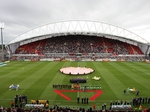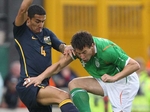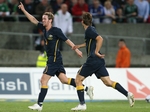The age-old maxim that proposes football to be a simple game is wholly dependent on what one’s concept of simple actually is.
For example, Archimedes possessed a mind brilliant, enough to formulate the profoundly simple principle of fluid displacement, but he had enormous difficulty in comprehending the essential difference between a 4-4-2 formation and the 4-2-3-1 system of play.
Mind you, good old Archie was in far from splendid isolation in this respect.
 The Irish team in Thomond Park on Wednesday also encountered great difficulty in encompassing an understanding of the Australian tactics on the night in question. As ever in the aftermath of defeat, there were questions and opinions in abundance and yet the overriding emotion was one of confusion. This simply was not supposed to happen.
The Irish team in Thomond Park on Wednesday also encountered great difficulty in encompassing an understanding of the Australian tactics on the night in question. As ever in the aftermath of defeat, there were questions and opinions in abundance and yet the overriding emotion was one of confusion. This simply was not supposed to happen.
The most basic system in football is the 4-4-2. While there are some variations on this theme the heart of the system is based on the partnerships around the team. The two centre backs are obviously main partners but they each possess an auxiliary partner in that the right sided centre back partners the right back with the same principle occurring on the left side of the defence.
It was on this left side of the Irish defence that most of our defensive problems occurred and especially so in the first 45 minutes.
The inexperience of Sean St Ledger showed itself on a regular basis. He got separated from Richard Dunne on too many occasions and particularly so when Tim Cahill ran from midfield - and he rarely covered his auxiliary partner Kevin Kilbane, as the second Australian goal demonstrated quite well.
St Ledger has potential, but at this quite crucial point in the  qualification group, experience overrides potential. For his part, Kilbane has been error prone in recent games. He was isolated too often in one-on-one situations in Limerick but at this level he has to show the ability to be able to handle such occurrences, which unfortunately he failed to do. He is however, nothing if not a fighter bound with enormous integrity, and he will accept fully that he has to prove something in Cyprus. This is dependent of course, on Trapatonni giving him the chance.
qualification group, experience overrides potential. For his part, Kilbane has been error prone in recent games. He was isolated too often in one-on-one situations in Limerick but at this level he has to show the ability to be able to handle such occurrences, which unfortunately he failed to do. He is however, nothing if not a fighter bound with enormous integrity, and he will accept fully that he has to prove something in Cyprus. This is dependent of course, on Trapatonni giving him the chance.
The Republic of Ireland also had problems in the midfield where they were outplayed and outthought.
The partnership that matters in a midfield four is the one between the two central players. The two Irish players in question, Glenn Whelan and Darron Gibson, were outnumbered as the Aussie system had two defensive midfielders sitting in front of their back four and these two players, Wilkshire and Jedinak, had three more midfield players; Kewell, Cahill and Bresciano, playing just ahead of them with a license to attack whenever the option occurred.
This meant that when the Irish team got the ball the Aussies, in the blink of an eye, had five players defending the midfield area and as soon as the ball changed hands the three attacking midfielders very quickly moved forward joining Scott McDonald. This further meant that it was virtually impossible for the Irish team to play through midfield, (Could Andy Reid have managed this?) and consequently our two wide men and the strikers became the best outlets. McGeady took the challenge and became our best attacking option in the opening half as Damien Duff had a very quiet time.
 With Kevin Doyle being far from fit a question mark hangs over the manager’s wisdom in selecting the Wolves player, but Trapatonni may have felt it was a worthwhile investment for the big game in Cyprus in three weeks time. Consequently this placed a huge onus on Doyle’s partner Robbie Keane, and to the Tallaght man’s credit he did cause the visiting defenders a few problems, with Mark Swartzer having to produce one particularly good stop from him.
With Kevin Doyle being far from fit a question mark hangs over the manager’s wisdom in selecting the Wolves player, but Trapatonni may have felt it was a worthwhile investment for the big game in Cyprus in three weeks time. Consequently this placed a huge onus on Doyle’s partner Robbie Keane, and to the Tallaght man’s credit he did cause the visiting defenders a few problems, with Mark Swartzer having to produce one particularly good stop from him.
However, irrespective of the system a team employs it is the performance of the players that decide whether a system is productive or not. The Australians were successful because on the night they had far more effective individual performances than the Irish did. Having a superior number of players in midfield is grand but it was the manner in which they made this superiority count that really dictated the way the evening went. They visitors closed the ball so quickly and with such determination that Shay Given actually received more ball to his feet from his own defenders than our forwards did.
Trapatonni did ensure that the second half performance was an improvement. A few longer cross-field balls bypassed the congested midfield and allowed Hunt and McGeady to take the opposing full backs on more. This was sensible management but the final product was still disappointing and even though Whelan worked tirelessly and Andrews almost pulled a goal back, the third goal from the visitors summed up the evening perfectly.
A short corner unacceptably produced a two against one situation for the Australian team and when the ball was switched into the middle of the field, their left back Carney, in acres of room and having all the time in the world, set up a shot that would have surely reached Cork had the groundsman not decided to put a net up on the goal earlier in the afternoon, such was the strength of the shot. A reversal of this situation would never have been allowed to happen, which is probably the most succinct observation of the evening’s proceedings.
for the Australian team and when the ball was switched into the middle of the field, their left back Carney, in acres of room and having all the time in the world, set up a shot that would have surely reached Cork had the groundsman not decided to put a net up on the goal earlier in the afternoon, such was the strength of the shot. A reversal of this situation would never have been allowed to happen, which is probably the most succinct observation of the evening’s proceedings.
The ability and the inclination to do the simple things quickly and effectively validate the true merits of every individual connected with professional football. Neglecting the principle of simplicity merely creates complication, which is a forerunner of confusion and ultimately a dereliction of duty.
Archimedes sat in his bath and allowed his creative genius to be massaged by simplicity. Running down the street in his nude a short while later shouting ‘Eureka’ was probably taking the process a shade too far. But he was a genius, and genius will always do whatever it must while talent can only do whatever it can.
D Richardson.

